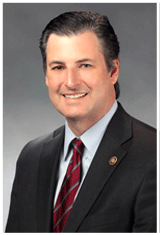JEFFERSON CITY, Mo. — Republican lawmakers seem determined to prevent adoption of Common Core Standards Initiative, as more legislation aimed at slowing the implementation of the new statewide education standards is expected to reach the Senate floor sometime this week.

Sen. John Lamping, R-Creve Coeur, has sponsored Senate Bill 210, which would create new requirements for the Department of Elementary and Secondary Education to make certain information publicly available before the new curriculum can be implemented.
The bill would require DESE to conduct at least one public hearing in each of Missouri’s congressional districts before “full implementation” of common core. Lamping told The Missouri Times that he expected the measure to reach the floor for debate soon, and that the public needs to hear the discussion.
“The public is in the dark,” Lamping said. “If we shed light on the issue, will 75 percent of them say ‘hey this is crazy?’ Or, will 75 percent say they are OK with it? We’re trying to assess at all times what the majority of Missourians think about this. What I know is the vast majority of Missourians don’t have an opinion on [Common Core Standards] because they don’t know.”
Sarah Potter, communications coordinator for DESE, agreed that the average Missourian might not know the details of the common core standards, which would be fully implemented in the next two years if undeterred, but said the department has worked “extremely hard” to get as much input as possible.
“We worked with hundreds of people and teachers and experts all over the state,” Potter said. “We worked with people right here in the state to write these new standards.”

Potter, who’s also a parent of a Columbia School District student, said her own district mailed information and conducted meetings on the new standards. She said most of the legislation directed at prohibiting common core standards is born out of confusion.
“We need to be clear that there are three issues: standards, curriculum and assessment,” Potter said. “A lot of schools have begun unpacking these new standards and it’s not uncommon for them to make that known to the parents of the district but not mention the words ‘common core’ specifically. In many cases we have people who have been to meetings or heard about the new standards but they simply didn’t realize it had to do with common core.”
Lamping’s bill would publicly track all data gathered by the common core initiative, requiring DESE to list all data collected by the program online as well as any and all groups or individuals with access to the information. It comes from concerns Republican lawmakers have voiced that data on individual students, rather than classes or schools, could be collected as a result of the new student assessments included in the curriculum.
“We won’t be collecting any data that we don’t already collect,” Potter said. “There is a lot of misinformation out there, but we’re gathering information as it relates to education. We aren’t asking about religious affiliations or anything like that, which is a rumor I’ve heard.”
Several House Republicans have said they see common core as the adoption of national education standards, creating a loss of control for local districts. The standards were developed in Missouri, Potter said, but that has not stopped legislation in both chambers aimed at halting common core.
Rep. Kurt Bahr, R-St. Charles, sits on the Elementary and Secondary Education Committee. Bahr has sponsored House Bill 616, which would prohibit the state Board of Education from adopting common core standards. Bahr cited numerous concerns about the assessments and the technology requirements on rural schools, as well as the collection of student data, as his primary motivators.
Potter says this is, again, the result of confusion.
“As a state we have always had education standards saying where someone should be by third grade or eighth grade or graduation,” Potter said. “But how you reach that standard, that’s still up to the local school district. So what textbook you use, or what strategy you use, that’s up to the school boards and the individual educators, that’s not up to us.”
Lamping’s original bill mirrored Bahr’s effort to cease common core altogether. He said that bill did not have enough support in the Senate, so he rewrote it to require additional information.
Lamping said the cost to implement the standards could reach into the hundreds of millions and that they have not been properly vetted by the General Assembly. He also chided DESE for not reaching out to the legislative committees on education, or the appropriations committee for education, when putting together the standards.
Potter said DESE had not yet approached the Appropriations Committee because they were still putting together an accurate picture of the real cost. She also said the price tag of common core has also been “grossly over stated.”
“We’re working on gathering the information to have a more exact number,” Potter said. “But I can tell you that these numbers of $200 million or $300 million, those are just completely baseless and way, way off.”
The standards still face significant hurdles to full implementation. Not only is DESE battling legislative efforts to take the teeth out of the new standards, but they will also need to approach the legislature within the next year to begin appropriating funds.
To contact Collin Reischman, email collin@themissouritimes.com, or via Twitter at @Collin_MOTimes.
Collin Reischman was the Managing Editor for The Missouri Times, and a graduate of Webster University with a Bachelor of Arts in Journalism.



